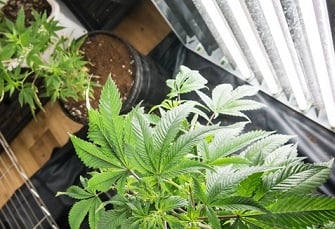Residential and commercial demand is on the rise in Smith Falls

Smiths Falls, Ontario – population 8,885 – is seeing a revival of fortunes since medical marijuana producer Tweed Inc. set up shop over 4 years ago in an abandoned Hershey Co. chocolate factory. The company, since renamed Canopy Growth Corp., has become the world’s largest publicly traded cannabis producer and is the town’s largest private-sector employer.
“We’re recognized as the pot capital of Canada – and we’re proud of that,” Mayor Shawn Pankow said in an interview with Bloomberg. “The local economy is certainly far better today than it was before Tweed came to town.”
Smiths Falls is on the rebound, with more younger people relocating to this town 75 kilometres southwest of the capital in Ottawa. There’s renewed interest in commercial property, new businesses are arriving, and there’s even the odd bidding war on homes.
“We’re seeing positive impacts really across the economy,” said Pankow, 52, who also runs a financial advisory firm. “People are recognizing that Smiths Falls is a community that’s on the upswing.”
Read more: Commentary: Legal implications of cannabis in Canadian commercial real estate
Canopy has since become one of the darlings of the Canada’s benchmark stock exchange. It’s the S&P/TSX Composite Index’s best performer in 2017, with pot stocks surging ahead of legalization.
Tweed took over a former Hershey factory with ambitious plans to grow medical marijuana. Today, the firm has 360 employees – a well-educated workforce that runs the administration, research, growing operations, packaging, and shipping from the facility that still has signage and other remnants of its chocolate past. Construction crews hammer away on the next expansion. The parking lot is packed.
“Smiths Falls welcomed us and we appreciated that,” said Chief Executive Officer Bruce Linton, who says he’s tapping local labor, suppliers and businesses as much as possible as the business gears up for the legalization of marijuana in Canada next summer. “The effect is the town becomes more desirable, and as it becomes more desirable my ability to recruit people who are senior or worldly increases.”
It’s a stark contrast from a decade ago, when Smiths Falls faced an industry exodus with the shutdown of a Stanley Tools Manufacturing facility and a shuttering of the Hershey plant. That followed months later by the closure of the Rideau Regional Centre for the developmentally disabled. The closures affected more than 1,500 people – one-fifth the population at the time.
Smiths Falls has faced ebbs and flows of industry throughout its history, stemming back about 190 years when crews came to build the Rideau Canal connecting Ottawa with Kingston. Decades later, the Canadian Pacific Railway arrived to provide a rail connection to the outside world, helping support commerce.
“It’s a town that constantly reinvents itself,” according to Leisa Purdonbell, who oversees the historical collections in the basement of an 1860s-era house that doubles as a museum. “Businesses have come and gone.”
Related stories:
Investment property owners group expresses concerns re: cannabis legalization
Cannabis investments to ignite a new wave of real estate mania
“We’re recognized as the pot capital of Canada – and we’re proud of that,” Mayor Shawn Pankow said in an interview with Bloomberg. “The local economy is certainly far better today than it was before Tweed came to town.”
Smiths Falls is on the rebound, with more younger people relocating to this town 75 kilometres southwest of the capital in Ottawa. There’s renewed interest in commercial property, new businesses are arriving, and there’s even the odd bidding war on homes.
“We’re seeing positive impacts really across the economy,” said Pankow, 52, who also runs a financial advisory firm. “People are recognizing that Smiths Falls is a community that’s on the upswing.”
Read more: Commentary: Legal implications of cannabis in Canadian commercial real estate
Canopy has since become one of the darlings of the Canada’s benchmark stock exchange. It’s the S&P/TSX Composite Index’s best performer in 2017, with pot stocks surging ahead of legalization.
Tweed took over a former Hershey factory with ambitious plans to grow medical marijuana. Today, the firm has 360 employees – a well-educated workforce that runs the administration, research, growing operations, packaging, and shipping from the facility that still has signage and other remnants of its chocolate past. Construction crews hammer away on the next expansion. The parking lot is packed.
“Smiths Falls welcomed us and we appreciated that,” said Chief Executive Officer Bruce Linton, who says he’s tapping local labor, suppliers and businesses as much as possible as the business gears up for the legalization of marijuana in Canada next summer. “The effect is the town becomes more desirable, and as it becomes more desirable my ability to recruit people who are senior or worldly increases.”
It’s a stark contrast from a decade ago, when Smiths Falls faced an industry exodus with the shutdown of a Stanley Tools Manufacturing facility and a shuttering of the Hershey plant. That followed months later by the closure of the Rideau Regional Centre for the developmentally disabled. The closures affected more than 1,500 people – one-fifth the population at the time.
Smiths Falls has faced ebbs and flows of industry throughout its history, stemming back about 190 years when crews came to build the Rideau Canal connecting Ottawa with Kingston. Decades later, the Canadian Pacific Railway arrived to provide a rail connection to the outside world, helping support commerce.
“It’s a town that constantly reinvents itself,” according to Leisa Purdonbell, who oversees the historical collections in the basement of an 1860s-era house that doubles as a museum. “Businesses have come and gone.”
Related stories:
Investment property owners group expresses concerns re: cannabis legalization
Cannabis investments to ignite a new wave of real estate mania



